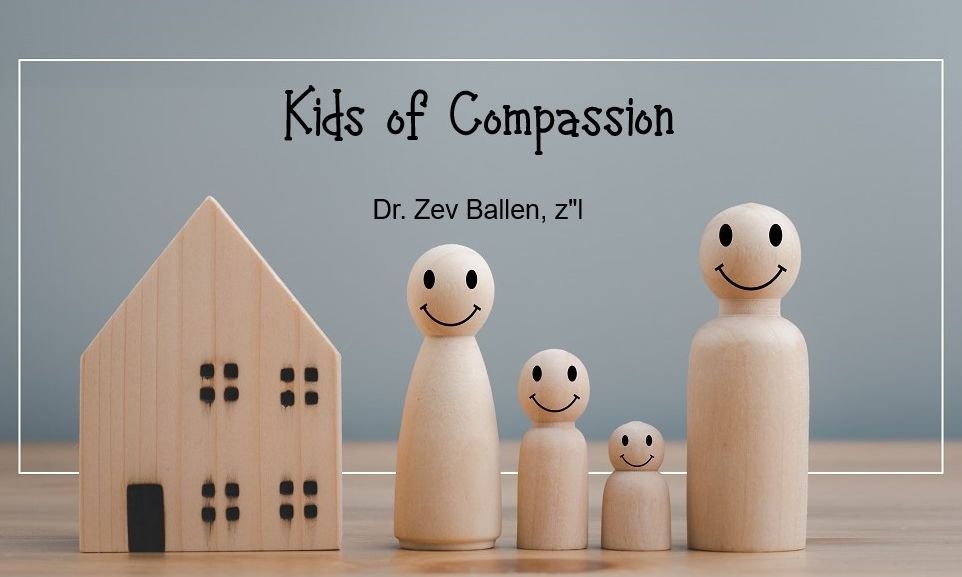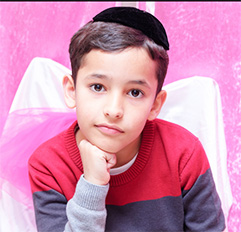
Kids of Compassion
How can we expect our children to have internalized a positive personality characteristic that we don’t possess ourselves? When did they last see us help a fellow human? INCLUDES VIDEO

Shortly before the holiday of Sukkot, this year, my wife was approached by our neighbor, who said that her kids were volunteering to build my sukkah for me. Apparently, our neighbor’s kids thought that I didn’t have enough people helping me to build my sukkah – that nailing together the heavy wooden boards and beams of the sukka and tying down the roof by myself might be too big a job for one person. I didn’t know much about these kids or their parents but they looked sincere and responsible so I accepted their offer to help.
Right away they began their work, happy with the knowledge that they were doing a good deed. Not only was my sukkah fully functional and ready in time for the holiday, but my neighbor’s kids put it together with so much care and attention to detail that you would have thought it was their own sukkah and not mine.
At the conclusion of the holiday, they returned, this time with a few more of their younger siblings who were obviously curious about all the kindness that their older siblings were busy doing for someone they hardly knew. The urge to act lovingly is infectious – soon they too were doing what they could to take part in the joy of giving to others. For an hour or so my apartment was filled with the positive energy of five  smiling kids running back and forth as they carefully dismantled the sukkah and neatly stored it away for the winter.
smiling kids running back and forth as they carefully dismantled the sukkah and neatly stored it away for the winter.
As I watched my neighbor’s young children toiling with such joy and love in their eyes I realized that they had been very well educated in the Torah Commandment of “Love your Neighbor as Yourself” (Leviticus 19). In my mind, I began to compare my neighbor’s children to my own. I started to feel sorry for myself and knew that I needed some time to process what was happening to me. I walked outside. The night air was cool and it was quiet on the street in front of my house.
“Hashem, I know this is a message for me. Show me what I’m doing wrong. Why don’t I have kids like these? Is it too late? How can I influence my own kids to be more like my neighbor’s kids? I lecture and write about parenting for Breslev Israel; I do marital and family therapy with people in order to help them improve their marriages and their relationships with their children; I learn with my own children and speak to them about Torah topics at our Shabbat table – Please, Hashem, enlighten me! I have wonderful children and I’m so proud of them in so many other ways, but what should I do now so that they will care more about the needs of other people?”
It was then that Hashem reminded me of something that I speak about all the time but which I obviously haven’t fully internalized in my own relationships with my children:
“You’ve got to live it to give it.”
My children aren’t to blame for not helping me with the sukkah. How can I expect them to have internalized a positive personality characteristic that I don’t possess myself? When was the last time that I volunteered to do heavy work for someone else in need? How often have my kids seen me running to help other people when it wasn’t part of my job as a therapist? Where am I honestly holding now in my own love and concern for my fellow human beings?
As I walked back into the house, I realized that I had nothing to feel bad about. I certainly have a lot of work to do on myself, but Hashem knows that I’m willing to try harder. The fact that I need to work on this area of my life doesn’t mean that I’m not a good person. I reminded myself of what Rabbi Shalom Arush says a person should repeat to himself whenever he is doing penitence for a shortcoming in himself: Remember, “You are good and you only want to do good!” By repeating this phrase to myself I remember three things:
- I’m not to blame. Like my own kids, I didn’t have role models like the Friedmans (my neighbors).
- So what if I have an evil inclination, everyone does, but my EI has nothing to do with my inherent goodness. My job is just to make an effort to fight my EI every day.
- Hashem won’t even judge me on the final outcome of how kind and loving I am to my neighbors in the future, He’ll only judge me on how loving and kind I desire to be and try to be.
I also realized that it was certainly not too late for me to positively influence my children in this area because Hashem is willing to give special help to someone who is making the effort to change himself in a particular area. It’s relieving to know that both I and my children can still end up big winners, if I only take some steps now to do better.
My first step was to thank my neighbors for their wonderful kids. I told them that although we’re practically strangers, I feel I really know them now because of the type of children that they have. By the way, while I’m admitting my faults to you, I want you to know that unfortunately prior to my experience with their children, I didn’t always judge my neighbors so favorably and I had absolutely no reason not to think well of them. More to work on…
My second step was to review The Garden of Education, by Rabbi Shalom Arush, which is all about how to raise loving upright children, not through lecturing and criticizing but through personal example.
My third step was to commit myself to working daily on my love for others during my personal prayer time.
My fourth step was to write this article in the hope that Hashem’s loving wake up call to me should be helpful to my neighbors everywhere.
Editor’s Note: Dr. Ballen explains further how to raise upright children in the following video:










Tell us what you think!
Thank you for your comment!
It will be published after approval by the Editor.